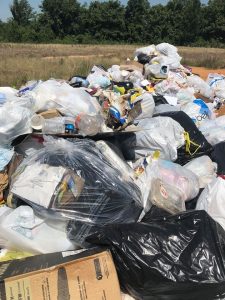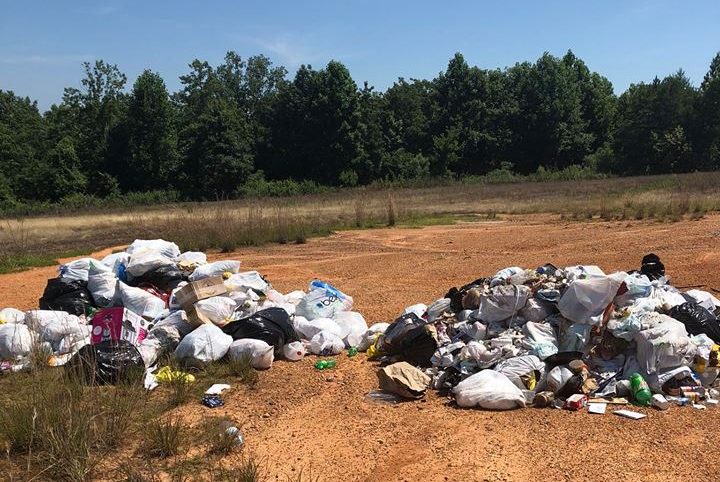Anyone who has spent much time outdoors in Alabama has seen it – trash on the roadside; litter tossed from car windows or blown out the back of a pickup truck heading down the highway. But, many people may not realize how much litter is intentionally dumped in mass out in our more remote woods.
As a hiker and backpacker for many years, I have seen ravines off of remote roadsides being used as extreme-rural residential landfills, with piles of trash bags, old tires, broken furniture, and even rusted out household appliances resting against otherwise majestic old trees growing from the hillside. I have also seen regular dumping areas closer into towns, yet still on remote roads. Once there was even a flowing creek at the bottom of the roadside dump, with bags of garbage spilling out into the water.
“Why focus on litter? Because it IS conservation. If it affects the environment, it affects fish and wildlife too … Disease can be spread to and by fish and wildlife and to humans because of garbage.” — Lt. Clifton A. Robinson
These scenes have always bewildered me. Even as a kid growing up in the Oakmulgee Ranger District of the Talledega National Forest, I became appalled at the amount of trash I ran across in the woods, not just on the roadside. It always made me feel gross and want a shower, as though I had rolled around in it myself. I wondered then – and still do – why do people do this? I also wondered why they couldn’t be caught and stopped.
Alabama Department of Conservation and Natural Resources officer Lieutenant Clifton Robinson took the idea of “why can’t we catch them and stop them” and made it an initiative within his command as Assistant Supervisor over seven west Alabama counties.
“Operation Oscar (an Oscar the Grouch reference) was a challenge I issued April 2018, to the ten officers in the counties I supervise of Bibb, Chilton, Shelby, Perry, Dallas, Autauga, and Lowndes,” Lt. Robinson said, “They were all challenged to make at least one litter case within a year. They all did that! And two officers literally made cases for dump truck loads of garbage.”

Officer Shawn Nixon initiated a case on Cahaba River Wildlife Management Area (CRWMA) in Shelby County in which his garbage was found and it led him to a trash company employee taking a shortcut he was not authorized by the company to do. The culprit dumped an entire garbage truck in the management area. Nixon said the company assisted with the investigation with great zeal and immediately fired the employee.
In Bibb County, Officer Ricky Corn made a dump truck load case on the Cahaba River National Wildlife Refuge, too. Corn made 16 total cases, with one pending investigation. 13 of these cases involved national forest dumping on Cahaba WMA, or Cahaba National Wildlife Refuge.
Operation Oscar successes in other counties:
- Chilton County: Officer Clint Tyus -1 case. Officer Shannon Calfee – 1 case.
- Shelby County: Officer Marcus Rowell – 1 on CWMA. Officer Shawn Nixon – 1 “but what a doozy” and 1 assist made on Cahaba WMA.
- Dallas County: Sgt. Alan Roach- 1 on Autauga WMA. Sgt. Joe Johnston – 2 cases.
- Autauga County: Officer Jason McHenry – 4 with one on Autauga WMA.
- Lowndes County: Officer Jeffrey Nimmer- 2 both on Lowndes WMA.
- Perry County: Officer Michael Duncan – 3 cases. Recently retired to take over his family’s recycling business.
Lt. Robinson notes:
![Lt. Clifton Robinson recently received the award for MISSISSIPPI FLYWAY WATERFOWL OFFICER OF THE YEAR and is an Assistant Supervisor in charge of the enforcement activities of 7 counties in West Central Alabama. [Bibb, Shelby, Chilton, Dallas, Perry, Autauga and Lowndes].](https://www.bibbvoice.com/wp-content/uploads/2019/07/Clifton-Robinson-300x300.jpg)
13A-7-29 provides that if certain identifying information is found in garbage that there is a rebuttable presumption that that person is responsible for said garbage. They can be interviewed and given 15 days to present evidence that they are not the person that illegally disposed of their trash. Oftentimes the suspect either confesses right away or is able to direct an officer to the guilty party.
Why focus on litter? Because it is conservation. If it affects the environment it affects fish and wildlife too. Fish and wildlife can become entangled or injured on or in garbage. Fish and wildlife can ingest garbage and become sick and/or die. Disease can be spread to and by fish and wildlife and to humans because of garbage. Land values for recreational purposes like hunting and fishing can be lowered due to illegal garbage dumping. The overall outdoor aesthetic experience is damaged by the presence of garbage. The great majority of the litter cases have been made on national forest, wildlife management areas, and public boat launches and public rivers.”
With the dedicated efforts of Lt. Robinson and his fellow officers, as well as others like them and the help of concerned citizens who are also tired of the perpetual litter, perhaps one day we will be rid of the problem. Perhaps one day people will no longer see an empty patch of ground in the woods as a place to get rid of their trash, but as a piece of nature to enjoy and help tend through conservation. It can only benefit all of us to do so.
If you see or know of illegal dumping in Bibb forests (Oakmulgee Ranger District), call and report it to the local office at (205) 926-9765. Or call the game and fish violations number 1-800-272-GAME.















Kudos to Cliff, Rick and the other game and fish officers for doing something about this problem! It IS NOT A “victimless” crime!
I hope with the increased revenue from the new feeding permit law (for deer an hogs) the Conservation dept. can give these guys a well deserved raise, give them more overtime and perhaps hire them some more help!
Great Job! Remember the newly passed HB 500 bill for the penalty phase.
[…] you recall a previous Bibb Voice article about Wildlife Officers fighting litter – Operation Oscar: Stopping the Trash – you’ve seen Ricky Corn’s name before. He’s the Alabama Department of […]